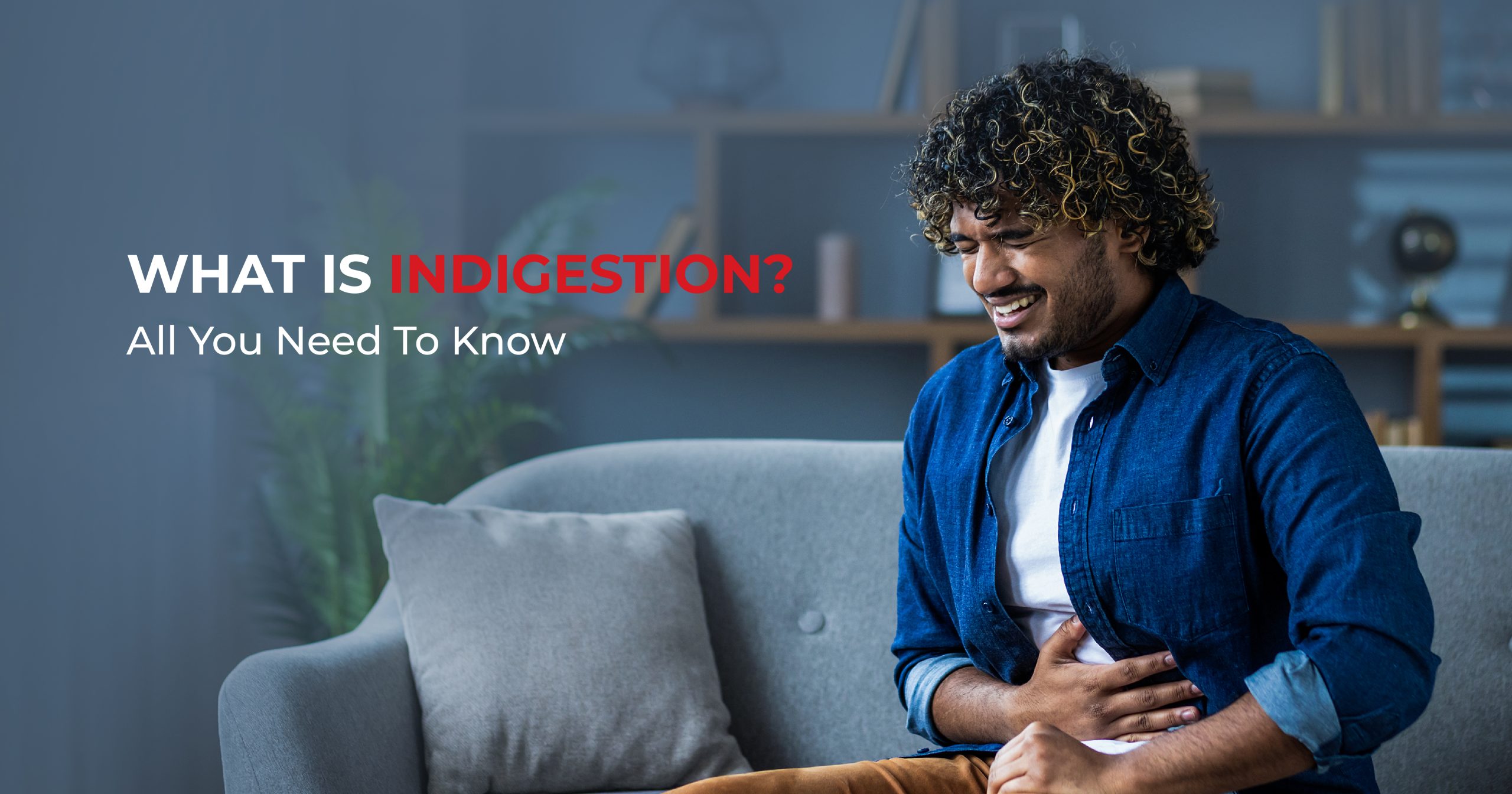What is indigestion? All You Need To Know
Date Created: 13 Nov 2025

Table of Contents
- What is Indigestion?
- What Causes Indigestion?
- What Are the Symptoms of Indigestion?
- Does Indigestion Cause Headache?
- What to Eat for Indigestion?
- How to Manage Indigestion?
- When to Consult a Doctor?
- Supporting Digestive Comfort the Herbal Way
- Conclusion
Have you ever felt heavy or bloated after a meal, even when you haven’t overeaten? That uneasy sensation many people dismiss as ‘just a full stomach’ is often indigestion, one of the most common digestive issues people experience.
While it’s usually mild, recurring indigestion can make eating less enjoyable and affect everyday comfort. Learning what indigestion is, what triggers it, and how to manage it gently can help support long-term digestive balance.
This article explains the common causes, symptoms, and simple ways to manage indigestion naturally, with a look at how herbal blends can help support digestive wellness.
What is indigestion?
Indigestion, also known as dyspepsia, is a term used for discomfort or pain in the upper abdomen that usually occurs after eating. It can make you feel full too soon, cause bloating, or leave a mild burning sensation in the stomach.
It’s not a disease in itself but a sign that the digestive system isn’t processing food efficiently. Some people experience it occasionally, while others may notice it more frequently, depending on their diet or lifestyle. Recognising and addressing these triggers early helps the digestive process work more smoothly.
What causes indigestion?
There are several reasons why indigestion happens. In many cases, it is linked to eating habits or certain lifestyle choices.
Common everyday causes include:
- Eating too quickly or overeating.
- Consuming rich, spicy, or fatty foods.
- Drinking too much caffeine, alcohol, or fizzy drinks.
- Smoking or eating late at night.
- High stress or irregular meal timings.
Sometimes, indigestion is triggered by medical factors such as gastritis, acid reflux, or peptic ulcers. Certain medicines like painkillers, antibiotics, and iron supplements can also irritate the stomach lining and lead to discomfort.
Everyone’s digestive system reacts differently. Paying attention to your routine can help you identify what causes indigestion in your case and make small adjustments to prevent it.
What are the symptoms of indigestion?
The signs of indigestion can vary from person to person, but they usually include:
- Pain or discomfort in the upper abdomen.
- Feeling full even after eating small portions.
- Bloating or excessive burping.
- Mild nausea or a sour taste in the mouth.
- A burning sensation in the upper stomach area.
Many people also report fatigue or mild uneasiness after heavy meals.
Does indigestion cause headache?
While indigestion does not directly cause headaches, the two can sometimes occur together. Poor digestion, dehydration, or disrupted sleep due to stomach discomfort can contribute to headaches. The gut and brain share a close connection, which means digestive distress can sometimes influence how you feel overall.
What to eat for indigestion?
Your diet plays a major role in maintaining healthy digestion. Choosing foods that are light, fresh, and easy to process helps the stomach work more smoothly.
Foods that may support digestion include:
- Warm, home-cooked meals in smaller portions.
- Fruits like bananas and papayas are gentle on the stomach.
- Soups, porridge, and lightly seasoned vegetables.
- Herbal teas such as ginger, fennel, or peppermint tea.
- Drinking enough water throughout the day.
Foods best avoided:
- Fried, spicy, or oily foods.
- Carbonated drinks and excess caffeine.
- Alcohol and processed snacks.
- Large, late-night meals.
Maintaining a food diary can help you understand what to eat for indigestion and which items to avoid based on your body’s response.
How to manage indigestion?
There is no one-size-fits-all approach to managing indigestion, but a few practical changes can make a real difference.
- Eat smaller meals at regular intervals instead of heavy portions.
- Chew food slowly and mindfully.
- Avoid lying down immediately after eating.
- Engage in light activity, such as walking after meals.
- Keep stress in check with relaxation techniques or simple breathing exercises.
These small habits help support natural digestion and reduce the chances of recurring discomfort.
People often ask how to cure indigestion or how to get rid of indigestion quickly, but it is better to focus on prevention and consistent habits rather than instant fixes. If symptoms persist, it’s always best to check with a healthcare professional.
When to consult a doctor?
Occasional indigestion is usually harmless, but if you notice these signs, it is worth seeking medical advice:
- Frequent or severe stomach discomfort.
- Difficulty swallowing or repeated vomiting.
- Unexplained weight loss.
- Black or bloody stools.
- Pain that spreads to your chest or back.
A healthcare professional can rule out any serious conditions and recommend appropriate treatment or tests if needed.
Supporting digestive comfort the herbal way
In Ayurveda, digestion is considered the foundation of overall wellbeing. A balanced digestive system helps the body absorb nutrients efficiently and maintain internal harmony. Traditional herbal blends often use ingredients like Triphala, Ajwain, Jeera, and Haritaki to support healthy digestion and ease discomfort naturally.
Conclusion
Indigestion is one of the most common digestive issues, yet often the most overlooked. Knowing what indigestion is, what causes indigestion, and what the symptoms of indigestion are helps you understand your body better. With simple dietary adjustments and mindful habits, most people can support smooth digestion and avoid discomfort.
At Meridian, we believe that caring for your digestion is part of caring for your overall health. Our Ayurvel Syrup is crafted to support the body’s natural digestive balance with the wisdom of Ayurveda and the reliability of modern formulation.
Recent Posts

Iron Deficiency: Symptoms, Causes and Treatment
Read More...
What is indigestion? All You Need To Know
Read More...

